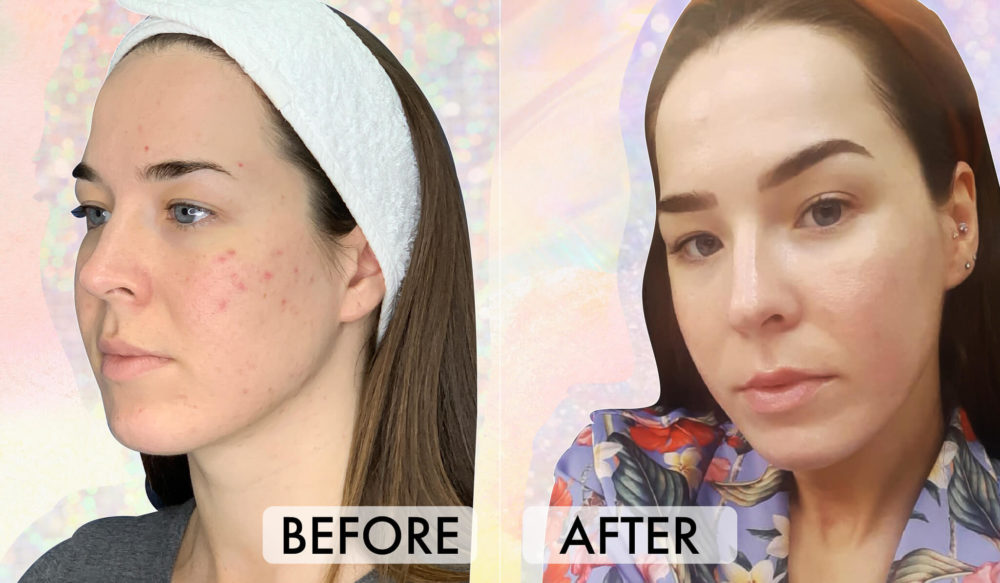The Retinol Myths That Could Be Ruining Your Skin

If we had to name the buzziest ingredient in the skincare industry right now, we’d put all our money — and every single makeup palette in our collection — on retinol. The vitamin A derivative has been a derm fave since the 80s, but has experienced a serious surge in popularity over the last few years as the science gets better and as more brands launch their own versions. Amid the hype, some misinformation has been propagated, but with expert insight, we’re here to shut. it. down.
What is Retinol?
Before we do some real ninja action on the myths, let’s do a quick debrief on retinol benefits for your skin:
“Well known for its anti-aging properties, retinol boosts collagen production, speeds up cell turnover, smooths out the surface of the skin to reduce pore size, brightens the complexion, reduces fine lines and wrinkles, and controls excess of oil production that can lead to breakouts,” says Alessandra Caceres, an esthetician and the founder of Miami Beach’s Lavender Facial Bar. “Everyone should be incorporating retinol in their skincare routine, especially after 30.”
Basically, retinol is a one-stop shop for your anti-aging needs. More importantly, it’s been scientifically proven — and repeatedly, we might add — to do all the above via prevention and correction. You can see why skincare experts and consumers alike fangirl over the stuff. As with many things in skincare, though, retinol carries some considerations and misconceptions. Let’s clear those up rn.
The Myth: Retinol, Retinoids, and Retinoic Acid Are All the Same Thing

The terminology surrounding retinoids are a major source of confusion. Many people lump all the terms together and assume they’re the same, but they’re not.
- The term “retinoids” is a blanket word for both “retinol” and “retinoic acid.”
- Retinoic acid is available only in prescription form from your doctor.
- Retinol is an ingredient that’s available to you in over-the-counter products.
Over-the-counter retinol products undergo a chemical transformation on your skin that turns the ingredient into retinoic acid. Because this transformation happens on your skin — versus in a controlled scientific setting as it does with prescription retinoid products — it’s not as strong.
The Myth: Retinoids Thin Your Skin
“Because people often experience peeling when they start using retinoids, they sometimes incorrectly assume that the retinoids are making their skin thinner,” says Hadley King, MD, a board-certified dermatologist based in New York City. “The opposite is actually true. Because retinoids stimulate collagen production, they actually help make the skin thicker. This is ideal because skin often thins with age and sun damage.”
The proof is in the scientific pudding: studies have demonstrated epidermal thickening after three to six months of topical retinoid use. Boom.
Posts You'll Love:
The Myth: You’ll See Results Right Away
Remember how we said retinol comes with some considerations? Well, how quickly it works is a big one. Dr. King says, “[The reality is that] prescription-strength retinoids can take three months for visible results, and over-the-counter retinol products can take six to 12 months for full results.”
Meanwhile, your skin is dealing with some notable reactions to the product as it “purges.” This process is referred to as “retinization” and common side effects include red skin, sensitivity, peeling, flaking, breakouts, and dryness. Literally the opposite of what you were going for, right?
The good news is that your skin acclimatizes after about four weeks. Also, you can reduce retinization symptoms by slowly introducing retinoids to your routine. That means using a low percentage product — ideally a retinol between .25 and .5 strength — and by using it two to three times a week versus daily. Wearing a moisturizer every day also helps a ton, just make sure the moisturizer doesn’t have any actives in it (like AHA, BHA, or vitamin C).
You can gradually build up to daily usage, and then switch to a higher concentration (eventually getting up to a prescription). A good pace is to up your dosage once every four weeks.
The Myth: You Shouldn’t Apply Retinoids Under Your Eyes

While it’s true that retinoid products do cause irritation when you first begin using them, that doesn’t mean you can’t apply them to the thin skin under your eyes.
“This delicate area is often where wrinkles show up first and it can definitely benefit from the collagen-stimulating effects of retinoids,” notes Dr. King. “If you are sensitive in this area, apply a moisturizer first and then the retinoid.”
Fun fact: you can actually go wild and apply retinoids all over yourself.
Posts You'll Love:
The Myth: Retinoids Increase Your Chance of Getting Skin Cancer
Sensitivity to the sun can occur when you first begin using retinoids, especially during the retinization process when skin is peeling. However, after a few months of use, your skin’s response to UV radiation returns to normal.
“I think one reason people believe this myth is that they are instructed to apply retinoids at bedtime, not during the day. This is because retinoids are often degraded by sunlight, which makes them less effective, not because they cause sun sensitivity,” notes Dr. King.
Craig Kraffert, MD, a board-certified dermatologist for Amarte skincare, seconds this. He says, “In actuality, retinoid products, like retinol, are well known to correct pre-cancers, slow growth of existing skin cancer, and decrease the risk of developing new skin cancer.”
The Myth: It’s Best to Use Retinoids Only After Wrinkles Show Up
Girl, preventative skincare is your bestie.
“It is completely appropriate for 20-somethings to incorporate retinol into an anti-aging skincare regimen. Start young, stay young,” says Dr. Kraffert. “After over 40 years of research and clinical study, there is an increasingly solid body of evidence that retinol regulates skin function in a positive way. There is no scientific evidence of skin damage by long term use of retinol, and it’s never too early to incorporate retinol into an anti-aging regimen.”
You heard it here, guys! Obsessed with retinol and want to start using it right away? Check out our guide to using retinol and some amazing derm-recommended products.























Leave a comment